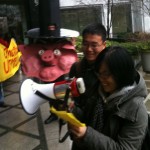 Here are twelve things you need to know about the Korea Free Trade Agreement, the biggest of the FTAs passed by Congress in October 2011…
Here are twelve things you need to know about the Korea Free Trade Agreement, the biggest of the FTAs passed by Congress in October 2011…
- The Korea Free Trade Agreement is the largest free trade agreement since NAFTA. South Korea is the 12th largest economy in the world, and one of America’s largest trading partners.
— - The Korea FTA would increase the U.S. trade deficit. This is the finding of the U.S. International Trade Commission, a federal agency that has traditionally underestimated the costs of potential trade pacts.
—
- The Korea FTA would cost the U.S. jobs. According to the Economic Policy Institute, imports from South Korea will displace 888,000 American jobs within seven years should the Korea FTA pass, with the FTA alone responsible for net 159,000 job losses.
—
- The Korea FTA would hurt some of America’s highest-paying industries. The USITC predicts that high-paying industries like motor vehicles and parts, electronics equipment, metal products and other transportation equipment are among those that will fare poorly under the Korea FTA.
—
- The Korea FTA would enable “Korean” cars sold in the United States to be largely made in third-party countries. The rule of origin in the Korea FTA was negotiated at an extraordinarily-low 35%, meaning that 65% of a Korean car’s value could be in parts made in even lower-wage nations like China, Vietnam and elsewhere — further undercutting U.S. auto manufacturers and the U.S. supply chain.
—
- The Korea FTA would create a substantial loophole for a wide range of items made in third-party nations to circumvent legitimate U.S. trade duties. With up to 65% of most finished “Korean” products able to be assembled from imported parts under the pacts rules of origin, it is easy for other countries to reap the benefits from the Korea FTA without making any concessions of their own.
—
- Even products assembled in South Korea with parts from North Korea’s Kaesong Industrial Complex could be allowed under the Korea FTA’s rules of origin. This is independent of any new agreement reached under Annex 22-B, and is a grave human rights and national security concern.
—
- The Korea FTA contains language explicitly forbidding reference to the International Labor Organization (ILO) conventions. This language was added as a footnote by the Bush administration back in 2007, winning praise from business groups and scorn from labor unions.
—
- The Korea FTA’s investment chapter poses a much more significant threat to U.S. public interest policies than most past FTAs. Unlike most developing countries, South Korea is a capital-exporting nation with significant investments throughout the U.S. Under the proposed FTA, Korean investors would be given extraordinary new rights to challenge U.S. laws, regulations and even court decisions as “regulatory takings” in international tribunals that circumvent the U.S. judicial system.
—
- The Korea FTA contains broad provisions encouraging financial deregulation. These provisions are privately enforceable, meaning that Wall Street can take steps to enforce them even if the U.S. government doesn’t.
—
- Key agricultural commodities are expected to lose out under the Korea FTA. The ITC list of commodities that will do poorly includes wheat, oilseed and “miscellaneous crops,” a category that includes hay, nursery products and more.
—
- The Korea FTA fails to safeguard against currency manipulation. South Korea is one of only three countries to ever be formally listed as a currency manipulator by the U.S. Treasury Department. Should the won again be undervalued, the potential benefit to U.S. exporters from reduced Korean tariffs could easily be wiped out.
It should come as no surprise that hundreds of organizations have spoken out against the Korea FTA.
To learn more, visit our main page on the Korea Free Trade Agreement




